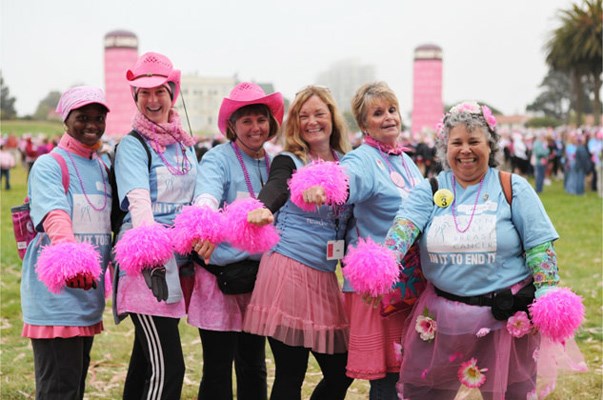"Women die of breast cancer simply because they are women. The most important risk factor of breast cancer is being a woman."
So said Dr. Olofunmilayo Olopade, a leader in clinical cancer genetics at the University of Chicago, in the film Pink Ribbons Inc., which will be featured on Friday, Feb. 10 in Richmond City Hall.
In the documentary, Olopade explains how there's little data on the cause of breast cancer. Which raises the question: How do you cure something if you don't know what causes it?
The Pink Ribbon campaign began in the early '90s when cancer survivor, Charlotte Hayley, introduced the concept of a peach coloured breast cancer awareness ribbon.
She attached them to cards saying, "The National Cancer Institute's annual budget is 1.8 billion U.S. dollars, and only five per cent goes to cancer prevention. Help us wake up our legislators and America by wearing this ribbon."
Over the last two decades, the campaign has grown exponentially, but it has entirely lost it's focus on prevention.
How and why that's happened is one of the two key questions the film presents. The other being, where does all that money go?
"Before I got involved in the film project, I knew very little about the Pink Ribbon campaign," said director and writer Lea Pool. "What I've learned is that breast cancer has become a lucrative business_women are being used by mass marketers to make profits on breast cancer.
Every year, millions of women around the world run or walk for the cure, proudly wearing pink ribbons, T-shirts, shorts and visors.
The international Pink Ribbon campaign is the largest international breast cancer fundraiser in the world. It's attracted high profile "ambassadors" such as Hollywood actress Reese Witherspoon and Cynthia Nixon (known for her role as Miranda in Sex in the City).
But there is no transparency for the funds raised each year - which are in the millions across North America, Pool said.
"We can't just walk and be cheerful," said the acclaimed filmmaker, who has won numerous international awards for her thought-provoking documentaries.
"Yes, we have to have hope, but we also have the right to be angry that this year and every year, 59,000 North American women will die from this disease."
Pink Ribbons Inc. also looks at the increased involvement of corporations in fundraising campaigns, and the impact that's had on charities.
Car manufacturers to fast food companies such as Kentucky Fried Chicken, to corporations such as Revlon, Avon and Estee Lauder, have embraced the cause - yet, the film suggests, the money raised has done more to raise the profile and profits of those companies than for breast cancer.
"For more than three years, we had two researchers and two journalists try to track where the money goes," Pool said.
"There is no global coordination as to where the money is spent, and here we have women walking for two days and most don't ask where the money they raise goes.
"Why aren't we hearing about new research?" she added. "Women have to be more suspicious."
Some of the most poignant and heart wrenching scenes in the film are of the women of the IV League - those dying from breast cancer.
"I felt it was important to show women who are living with the reality of breast cancer," said Pool.
"The film cuts from scenes of happy, costumed women running and walking for the cure to an IV League woman talking about dying."
Pool came on board after reading a few books on the Pink Ribbon campaign, most notably one by Samantha King.
"After the producer, a breast cancer survivor, gave me Samantha's book (Pink Ribbons, Inc. - Breast Cancer and the Politics of Philanthropy), I knew there were important questions to be asked about how the money raised is being used," said Pool.
In the end, Pool hopes the movie encourages women to question their actions.
"To use their power as women to mobilize and unite, but use it with more reflection and activism," she said.
"To be more critical and more politically conscious about our actions and to stop thinking that by buying pink toilet paper we're doing what needs to be done."
Pool doesn't suggest that women shouldn't be raising money for breast cancer, but rather that "you think before you pink."
DOXA Documentary Film Festival presents Pink Ribbons Inc. on Friday, Feb. 10 at 7 p.m. in Richmond City Hall, Council Chambers, 6911 No. 3 Rd. Tickets are $10 available through DOXA website at www.doxafestival.ca or by calling 604-646-3200.
For more information about this documentary, visit DOXA's website.
Statistics
- Since 1940, the increase in breast cancer diagnoses has risen from one in 22 to one in eight.
- Breast cancer claims the lives of 59,000 North American women every year.
- Women diagnosed with breast cancer today face the same treatment options they did 40 years ago.
This includes surgery, radiation and chemotherapy.
- Today, the Pink Ribbon Inc. movement is in more than 30 countries over five continents.



